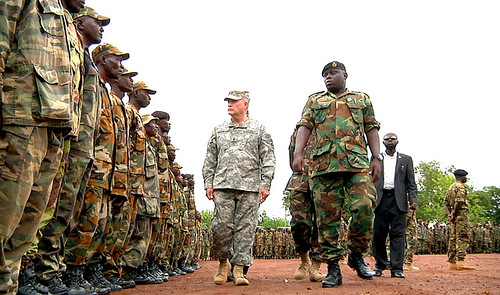
United States Army Africa (USARAF) inspects troops from the Republic of Sierra Leone Armed Forces (RSLAF) in Freetown. AFRICOM trained 1,000 troops from the West African state for deployment to Somalia to participate in AMISOM., a photo by Pan-African News Wire File Photos on Flickr.
Rhetoric, reality of Africom
Monday, 01 October 2012 00:00
Abena Ampofoa Asare
Pambazuka News
Six months after an ill-fated military coup d’état, the news from Mali continues to be distressing. A collection of rebel groups are steadily gaining ground in the Northern region while the Economic Community of West African States (Ecowas) tries to drum up support to deploy security forces on behalf of Mali’s beleaguered government.
Tens of thousands of displaced persons are confronting hunger and insecurity in refugee camps throughout the region. While the disintegration of Mali’s political stability is a heartbreaking twist of fate for a country which has long prided itself on its stable electoral democracy, the country’s recent trajectory is an important warning for the rest of African continent.
First, regularly-spaced presidential elections are not the entirety of a strong democracy.
Second, African governments should think twice about the presence of United States Africa Command (Africom) within their borders.
Africom bills itself as a force for democracy, humanitarianism and good governance in Africa by claiming that United States interests are safest when African governments are strong.
Just last August, General Carter Ham (commander Africom) described the security of partner states as one critical measure of Africom’s mission. Are governments capable of guarding their own national borders and contributing regionally? Do their militaries adhere to the rule of law and respect the people they serve? These indicators, he noted, are the benchmarks of Africom’s success.
Ironically, for over a decade, Mali has been a key Africom partner. To the tune of millions, US forces have provided special operations, drug trafficking and counter terrorism training in the large West African nation. Today’s Mali of the shattered democracy and roving rebel groups is a troubling picture of an Africom partner state.
On 22 March, scarcely a month before presidential elections, Captain Amadou Sanogo, seized control of the government by promising to quell the Tuareg autonomy struggle in the country’s northern region.
Within ten days of the takeover, the army was entirely routed by Tuareg forces. Since April, the Tuareg in turn have been struggling to hold their ground against multiple rebel groups with varying agendas who have entered the northern region’s political vacuum.
The most well-known of these is Ansar Eddine, responsible for the desecration of the world heritage site that is Timbuktu. The presence of Al Qaeda in the Maghreb (AQM), an Islamist organisation tenuously connected to the Al Qaeda franchise, is also central to global anxieties about terrorism in West Africa. The secessionist Tuareg state, Azawad, has called for international help by asserting its identity as “the new ally in the war on terror”.
Meanwhile, drought conditions coupled with political violence have led to the displacement of an estimated 440 000 people. The storm clouds of a massive humanitarian disaster are gathering.
By its own standard, Africom’s mission in Mali has failed. Captain Sanogo, the coup-maker who bears the greatest immediate responsibility for plunging Mali into political unrest, was extensively trained by Africom, even travelling to the Georgia, Virginia and Texas for Department of Defence additional enrichment.
In addition, there has been a parade of social scientists warning that US policies are undermining Mali’s security. In 2003, one observer warned that by empowering the Bamako government to crack down on northern Islamic groups, US government initiatives were “creating enemies where there were none before”.
A 2007 article in the Journal of Contemporary African History claimed that US policies were actually making Mali more unstable. Again, in 2009, historian Vijay Prashad reported on the risk associated with Africom’s dogged empowerment of the Malian army.
Instead of encouraging former president Touré’s government to incorporate the disaffected northern region into the country by providing social and economic services to some of the world’s poorest communities, Africom offered powerful economic incentives for Bamako to choose militarisation as the answer to the Tuareg secessionist impulse.
On the ground, Africom’s arms and support have been found lacking. Where were the border control, communication and intelligence resources when Tuareg fighters, heavily armed and spoiling for a fight, crossed the borders from Libya, to Algeria, to Mali? When the Malian government struggled to hold its own against rebel fighters in the north, where was Africom’s equipment and expertise?
When the US-trained Captain Sanogo mutinied, the US State Department did not publicly consider its responsibility for a disastrous action taken by soldiers trained to be too big for their britches.
For students of African history, the notion that African democracy, stability and good governance will result from more deadly arms and more powerful soldiers is the stuff of satire and yet this is precisely the grounds on which Africom functions. In Mali, US money, training and rhetoric created an unbalanced situation where increasingly powerful military men with outsized ambition swagger around in one of the world’s poorest nations.
There is little to suggest that militarisation will ease any of Africa’s political and social problems. Yet, instead of honestly and transparently looking at these hard lessons, Africom rolls on with its rhetoric, ignoring the wreckage trailing behind it.
— Pambazuka News.
No comments:
Post a Comment